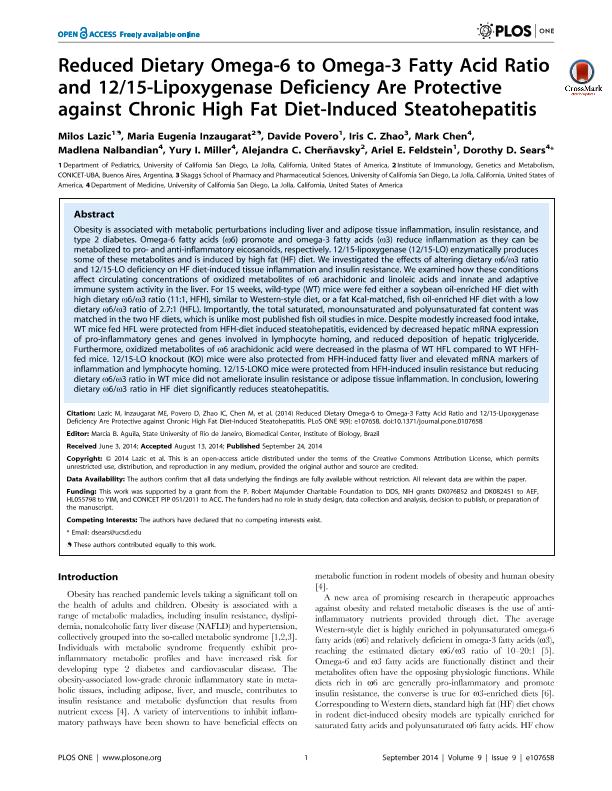Artículo
Reduced dietary omega-6 to omega-3 fatty acid ratio and 12/15-lipoxygenase deficiency are protective against chronic high fat diet-induced steatohepatitis
Lazic, Milos; Inzaugarat, Maria Eugenia ; Povero, Davide; Zhao, Iris C.; Chen, Mark; Nalbandian, Madlena; Miller, Yury I.; Cherñavsky, Alejandra Claudia
; Povero, Davide; Zhao, Iris C.; Chen, Mark; Nalbandian, Madlena; Miller, Yury I.; Cherñavsky, Alejandra Claudia ; Feldstein, Ariel E.; Sears, Dorothy D.
; Feldstein, Ariel E.; Sears, Dorothy D.
 ; Povero, Davide; Zhao, Iris C.; Chen, Mark; Nalbandian, Madlena; Miller, Yury I.; Cherñavsky, Alejandra Claudia
; Povero, Davide; Zhao, Iris C.; Chen, Mark; Nalbandian, Madlena; Miller, Yury I.; Cherñavsky, Alejandra Claudia ; Feldstein, Ariel E.; Sears, Dorothy D.
; Feldstein, Ariel E.; Sears, Dorothy D.
Fecha de publicación:
09/2014
Editorial:
Public Library of Science
Revista:
Plos One
ISSN:
1932-6203
Idioma:
Inglés
Tipo de recurso:
Artículo publicado
Clasificación temática:
Resumen
Obesity is associated with metabolic perturbations including liver and adipose tissue inflammation, insulin resistance, and type 2 diabetes. Omega-6 fatty acids (ω6) promote and omega-3 fatty acids (ω3) reduce inflammation as they can be metabolized to pro- and anti-inflammatory eicosanoids, respectively. 12/15-lipoxygenase (12/15-LO) enzymatically produces some of these metabolites and is induced by high fat (HF) diet. We investigated the effects of altering dietary ω6/ω3 ratio and 12/15-LO deficiency on HF diet-induced tissue inflammation and insulin resistance. We examined how these conditions affect circulating concentrations of oxidized metabolites of ω6 arachidonic and linoleic acids and innate and adaptive immune system activity in the liver. For 15 weeks, wild-type (WT) mice were fed either a soybean oil-enriched HF diet with high dietary ω6/ω3 ratio (11∶1, HFH), similar to Western-style diet, or a fat Kcal-matched, fish oil-enriched HF diet with a low dietary ω6/ω3 ratio of 2.7∶1 (HFL). Importantly, the total saturated, monounsaturated and polyunsaturated fat content was matched in the two HF diets, which is unlike most published fish oil studies in mice. Despite modestly increased food intake, WT mice fed HFL were protected from HFH-diet induced steatohepatitis, evidenced by decreased hepatic mRNA expression of pro-inflammatory genes and genes involved in lymphocyte homing, and reduced deposition of hepatic triglyceride. Furthermore, oxidized metabolites of ω6 arachidonic acid were decreased in the plasma of WT HFL compared to WT HFH-fed mice. 12/15-LO knockout (KO) mice were also protected from HFH-induced fatty liver and elevated mRNA markers of inflammation and lymphocyte homing. 12/15-LOKO mice were protected from HFH-induced insulin resistance but reducing dietary ω6/ω3 ratio in WT mice did not ameliorate insulin resistance or adipose tissue inflammation. In conclusion, lowering dietary ω6/ω3 ratio in HF diet significantly reduces steatohepatitis.
Palabras clave:
Omega 3
,
12/15 Lypoxigenase
,
Nafld
,
Immunity
Archivos asociados
Licencia
Identificadores
Colecciones
Articulos(INIGEM)
Articulos de INSTITUTO DE INMUNOLOGIA, GENETICA Y METABOLISMO
Articulos de INSTITUTO DE INMUNOLOGIA, GENETICA Y METABOLISMO
Citación
Lazic, Milos; Inzaugarat, Maria Eugenia; Povero, Davide; Zhao, Iris C.; Chen, Mark; et al.; Reduced dietary omega-6 to omega-3 fatty acid ratio and 12/15-lipoxygenase deficiency are protective against chronic high fat diet-induced steatohepatitis; Public Library of Science; Plos One; 9; 9; 9-2014; 1-11; e107658
Compartir
Altmétricas



